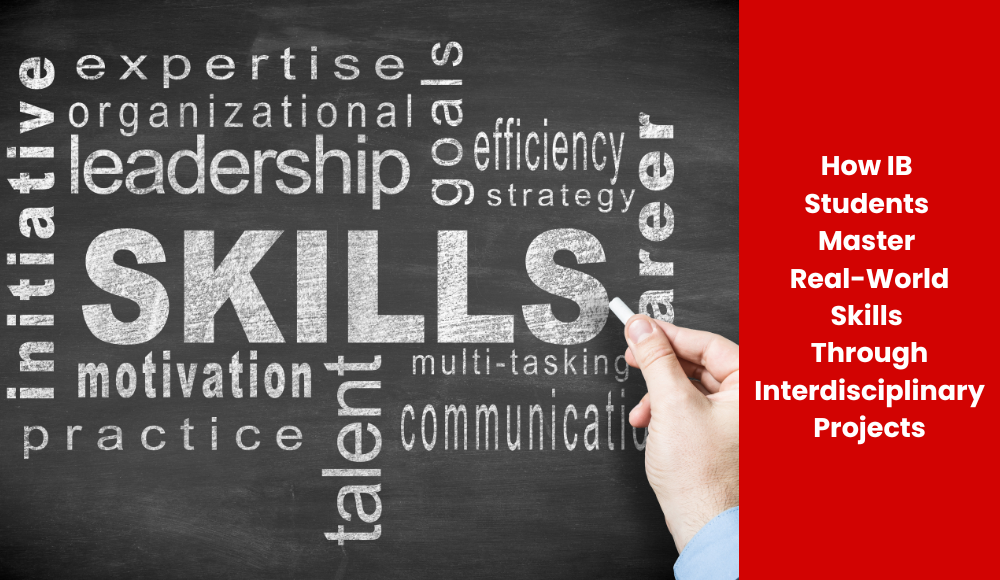How IB Students Master Real-World Skills Through Interdisciplinary Projects
The International Baccalaureate (IB) program is widely recognized for its emphasis on holistic development, critical thinking, and real-world applicability. The students engage in interdisciplinary projects that allow them to connect academic concepts from different disciplines, while developing essential skills that extend far beyond the classroom. These interdisciplinary projects are not just about mastering content but are designed to cultivate practical problem-solving abilities, teamwork, and creativity—skills that are vital in today’s complex and rapidly changing world. By integrating various subject areas and encouraging students to tackle real-world challenges, the IB program equips students with the tools they need to succeed in their future careers and contribute meaningfully to society.
The Value of Interdisciplinary Learning in the IB Program
Interdisciplinary learning within the IB program is an approach that promotes the integration of knowledge across various subjects. Instead of learning subjects in isolation, students engage with concepts and ideas that span multiple disciplines, helping them see the connections between different areas of knowledge. This method fosters deeper understanding and allows students to apply their learning to real-world situations. This approach is used to encourage students to think critically, synthesize information from different sources, and approach problems from diverse angles. The real-world relevance of these projects helps students appreciate the practical application of their academic studies.
Encouraging Problem-Solving and Critical Thinking
One of the key benefits of interdisciplinary projects in the IB program is that they require students to solve complex problems that have no simple answers. Whether they are designing sustainable solutions to local environmental issues or developing a business model for a new product, students must think critically and creatively to find innovative solutions. These projects encourage students to break down complex issues, analyze different perspectives, and evaluate possible outcomes. This critical thinking process is invaluable in preparing students for the challenges they will face in their careers, where they will need to navigate uncertainty and make decisions that can have wide-reaching consequences.
Real-World Application of Academic Knowledge
Interdisciplinary projects are designed to connect academic knowledge with real-world scenarios. For example, students studying economics and environmental science might collaborate on a project to design a sustainable business model for a green startup. This approach allows students to apply what they’ve learned in the classroom to real-life problems, making their education more meaningful and impactful. Students are encouraged to think about the broader implications of their work and consider how their solutions can address societal challenges such as climate change, inequality, and resource management. This practical application of knowledge helps students develop a deeper understanding of the relevance of their studies and motivates them to take an active role in shaping the world around them.
Developing Collaboration and Teamwork Skills
Interdisciplinary projects also place a strong emphasis on collaboration and teamwork. These projects often involve students from different subject areas working together to achieve a common goal. By working with peers who bring different perspectives and expertise to the table, students learn to communicate effectively, share ideas, and respect the viewpoints of others. Collaboration is a crucial skill in today’s interconnected world, where most professions require teamwork across disciplines. Through interdisciplinary projects, students develop the interpersonal skills needed to work in diverse teams and lead collaborative efforts in both academic and professional settings.
Fostering Creativity and Innovation
Interdisciplinary projects encourage creativity by allowing students to approach problems from multiple angles and explore innovative solutions. Whether they are developing a new product, conducting a research project, or creating a community outreach program, students are encouraged to think outside the box and push the boundaries of traditional academic disciplines. This emphasis on creativity and innovation not only helps students find unique solutions to problems but also prepares them for careers in industries that require inventive thinking, such as technology, design, and entrepreneurship.
Building Communication Skills Through Cross-Disciplinary Presentations
Another key aspect of interdisciplinary projects is the emphasis on effective communication. Students often present their findings, solutions, and recommendations to a panel of teachers, peers, or external experts. These presentations require students to articulate their ideas clearly, defend their conclusions, and engage in meaningful discussions. This process helps students develop essential communication skills, including public speaking, writing, and visual presentation. Being able to communicate complex ideas effectively is crucial in nearly every field, and interdisciplinary projects provide a platform for students to hone these skills in a real-world context.
Encouraging Reflection and Personal Growth
Reflection is an integral part of the interdisciplinary project process. After completing a project, students are encouraged to reflect on their experiences, identify what they learned, and consider how they can improve in the future. This reflective practice not only helps students consolidate their learning but also promotes personal growth. By evaluating their performance, students develop self-awareness and a growth mindset, which encourages them to continuously strive for improvement. This emphasis on reflection also helps students develop emotional intelligence, as they learn to assess their strengths and weaknesses and set goals for their future development.
Bridging Theory and Practice with Service Learning
Interdisciplinary projects are often linked with service learning, which allows students to apply their academic knowledge to benefit their local communities. Through service learning, students engage in projects that address social, environmental, or economic issues within the community. For example, students in a business and social sciences class may work together to design a marketing campaign for a non-profit organization or create an awareness program about sustainable living for local residents. These service learning projects provide students with the opportunity to make a tangible impact while deepening their understanding of how academic concepts can be applied in practical ways.
The Role of Technology in Interdisciplinary Projects
In today’s digital age, technology plays a crucial role in facilitating interdisciplinary projects. Students use digital tools to collaborate, conduct research, analyze data, and present their findings. Whether they are using data analytics software to interpret research results or creating digital prototypes for a product design, technology enhances the learning experience and allows students to engage with interdisciplinary projects in innovative ways. By incorporating technology into their projects, students develop essential digital literacy skills that will serve them well in their future careers.
Preparing Students for Future Careers
The skills that students develop through interdisciplinary projects are highly transferable and highly valued by employers. In many professional fields, employees are expected to work across disciplines, combining knowledge from different areas to solve complex problems. Whether it’s a business manager working with marketing, finance, and operations teams, or an engineer collaborating with designers, marketers, and developers, the ability to work across disciplines is essential. By engaging in interdisciplinary projects during their education, students are better prepared to enter the workforce with the skills needed to succeed in today’s collaborative, interdisciplinary work environments.
The Long-Term Impact of Interdisciplinary Learning
The long-term impact of interdisciplinary learning extends far beyond graduation. Students who have participated in interdisciplinary projects are better equipped to think critically, solve problems creatively, and work collaboratively in their future careers. These skills are valuable not only in academic settings but also in everyday life, where individuals must navigate complex issues and make informed decisions. The ability to approach problems from multiple perspectives, consider diverse viewpoints, and collaborate with others is invaluable in a rapidly changing world. As students move into the professional world, the interdisciplinary skills they develop will continue to serve them well, helping them excel in their careers and make meaningful contributions to society.
Conclusion:
Interdisciplinary projects are at the heart of the IB program, providing students with the opportunity to master real-world skills that extend far beyond the classroom. These projects, students learn to think critically, collaborate with peers, apply academic knowledge to real-world challenges, and develop essential skills such as problem-solving, creativity, and communication. By fostering these skills, we ensure that its students are not only academically successful but also prepared to lead and innovate in an ever-changing world. As the school continues to embrace interdisciplinary learning, it remains committed to preparing students for the challenges and opportunities of the future, empowering them to become the leaders of tomorrow.


